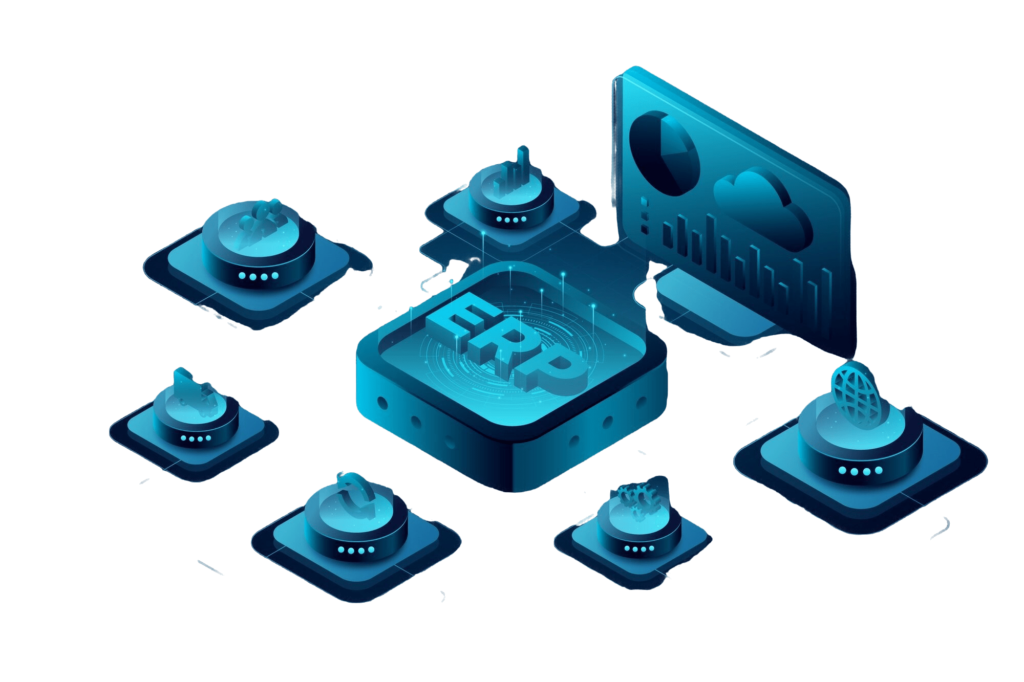To stay competitive, businesses need to ensure efficient operations, seamless communication across departments, and data-driven decision-making. Enterprise Resource Planning (ERP) software enables companies to centralize core processes, reduce manual work, and enhance productivity across the board. With ERP, businesses can simplify their workflows, gain full visibility over their operations, and maximize resource utilization.
Key Benefits of ERP
Enterprise Resource Planning (ERP) software brings diverse business functions—such as finance, inventory, sales, human resources, and customer relations—into a unified system. This integrated approach provides real-time data, helping teams collaborate efficiently and make informed choices that support growth and profitability.
Operational Efficiency: ERP systems automate routine tasks, reducing manual work and human error. By streamlining repetitive tasks, employees can redirect their efforts toward more critical, strategic activities.
Improved Collaboration: Information silos are eliminated as ERP systems offer a single source of truth, making data accessible across departments. This transparency enhances communication, speeds up response times, and creates a cohesive working environment.
Data-Driven Decisions: ERP provides real-time insights, enabling managers to analyze trends, forecast demands, and act proactively. From supply chain adjustments to resource planning, ERP helps leaders make more confident, data-supported decisions.
Scalability: As companies expand, their needs change. ERP systems are designed to grow with a business, offering flexibility to add new functionalities or integrate with other systems as requirements evolve.
Cost Savings: ERP reduces costs associated with manual processes, excess inventory, and delayed responses. Though the initial investment can be significant, the long-term savings and operational efficiency gains typically outweigh the cost.
Streamlining Operations with ERP
A key advantage of ERP is its ability to streamline operations by integrating and automating various business functions. This cohesion minimizes redundancy and ensures that resources are directed where they’re most needed. For example, ERP can be highly effective for manufacturing companies managing supply chains, production schedules, and inventory.
Automated Inventory Management: ERP software monitors inventory in real-time, generating alerts when levels are low or supplies need replenishing. This proactive approach reduces the risk of stockouts and overstocking, keeping production on track.
Efficient Financial Management: By consolidating accounting, budgeting, and reporting, ERP software simplifies financial oversight. Businesses gain an accurate view of cash flow and expenses, empowering management to make informed decisions that avoid unnecessary expenditures.
Streamlined Workforce Management: From scheduling to tracking productivity, ERP helps businesses optimize employee management. Automated attendance tracking and payroll systems reduce administrative tasks, allowing HR to focus on employee engagement and development.
Enhanced Customer Relationship Management (CRM): Many ERP systems incorporate CRM tools to manage customer interactions, track sales, and support personalized marketing. This strengthens customer relationships and builds loyalty, positively impacting revenue.
Boosting Productivity with ERP Software
ERP systems are instrumental in boosting productivity by minimizing downtime and inefficiencies. With all essential data in one place, employees can access the information they need quickly, reducing delays and redundancies.
Centralized Data Access: ERP software provides a unified platform for all business data, eliminating the need to switch between systems. This makes workflows more efficient, allowing employees to focus on essential tasks instead of administrative duties.
Automated Tasks: From invoicing to production scheduling, ERP automates repetitive tasks, enabling employees to prioritize higher-value projects. Automation also ensures that deadlines are met and helps maintain quality standards.
Improved Supply Chain Coordination: ERP systems help businesses synchronize demand planning, procurement, and inventory management. Real-time updates help teams avoid bottlenecks, reduce lead times, and keep product deliveries on schedule.
Resource Optimization: ERP lets businesses track resource allocation and usage across departments, pinpointing areas for improvement. This approach minimizes wastage, optimizes labor, and ensures that the right resources are in place to support productivity.
Conclusion
Investing in ERP is a transformative step toward building a resilient, efficient business. By unifying processes and enhancing productivity, ERP empowers companies to respond to market demands quickly and strategically. Whether through improved data access, streamlined workflows, or enhanced customer management, ERP helps businesses elevate their operations and achieve sustainable growth. Embracing ERP is not just an investment in software; it’s a strategic move toward long-term success.






More Stories
Plastic Recycling Machine Market Segment, Companies, Trend & Growth Analysis 2024-30
How to Find the Best Shipping Services Near Me
Elevate Your Brand Through Advanced Apps By Leading App Development Company Dubai -Dxb Apps